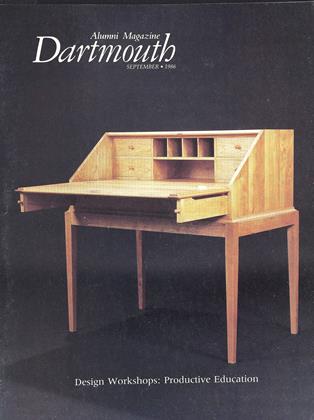The presence of the entire class of 1988 for the new Sophomore Summer may have dominated the summer term, but a full schedule of institutes and continuing-edu- cation programs had its usual important place, and groups ranging in size from a dozen to 200 came and went from late June to late August.
Fifteen different programs attracted scholars, business executives, school teach- ers, alumni, and those who simply wanted to learn about computers, improve their language skills, or stretch their minds with new ideas and perspectives presented by Dartmouth professors. The opportunities fell into four main categories: computer pro- grams, language programs, executive pro- grams, and liberal studies programs.
Among the computer programs were two one-week sessions, one for high-level ex- ecutives and one entitled Computer Alumni College. The third program, lasting a month, was designed to teach computer lit- eracy to 35 high school teachers from rural New Hampshire and Vermont and from several inner-city schools.
Using the celebrated Rassias Method, two All Language Programs gave concen- trated instruction to hundreds who wanted to learn to speak French, German, Italian, Spanish, Russian, and Japanese. The lan- guage Outreach Program (LORE) reversed things and taught English. Thrity Japanese students were in town for the month of Au- gust, getting exposure to American ciilture as well as the language. In late July, Citi- bank sponsored a program, English as a second language, for Latin American busi- ness executives.
Tuck School repeated three of its well- known summer programs: the Tuck Exec- utive Program, now in its 13th year, de- signed for high potential general managers; the one-week Minority Business Executive Seminar for owners and top executives of minority-owned firms; and the Effective Management of Production Operations for managers involved in manufacturing. Total attendance for all three exceeded 200.
The star attraction under the liberal stud- ies was Dartmouth Alumni College, which gave 200 adults a heavy dose of lectures, discussions, readings, and cultural events, all related to the general theme, "The Ma- chine in the Garden: Science, Technology and Culture." The Dartmouth Institute brought 55 senior executives and wives to the campus for four weeks, not for business studies but for liberal arts examination of American culture, science, and values.
The program leading to the master's de- gree in liberal studies, begun for adults in 1970, again offered a summer term, this year focused on business, educational and medical ethics. Further liberal studies activ- ity, supported by the National Endowment for the Humanities, took the form of the Dante Institute, the Institute on Greek Trag- edy in Translation, the Seminar on Litera- ture and Music, and the postdoctoral and graduate students.
 View Full Issue
View Full Issue
More From This Issue
-
 Feature
FeatureLate Afternoon Thoughts On the Twentieth Century
September 1986 By LEWIS THOMAS -
 Cover Story
Cover Story"The Art of Making Things Right"
September 1986 By PETER J. ROBBIE '69 -
 Sports
SportsSports
September 1986 By Jim Needham '70 -
 Article
ArticleDartmouth Authors
September 1986 By C. E. Widmayer -
 Article
ArticleReady for Lift Off
September 1986 By Jock McDonald '87 -
 Article
ArticleSandy Apgar '62 A books and mortar man
September 1986 By David K. Martin '54
Article
-
 Article
ArticleSENIOR SOCIETIES
April, 1923 -
 Article
ArticlePresident's Engagements
April 1934 -
 Article
Article"I Thought I Had It Made"
FEBRUARY 1994 -
 Article
ArticleStudent Deferment
May 1951 By C.E.W. -
 Article
ArticleThose Were the Good Old Days . . . About Twenty-Five Tears Ago
April 1933 By Hap Hinman '10 -
 Article
ArticleHanover Browsing
October 1946 By HERBERT F. WEST '22

